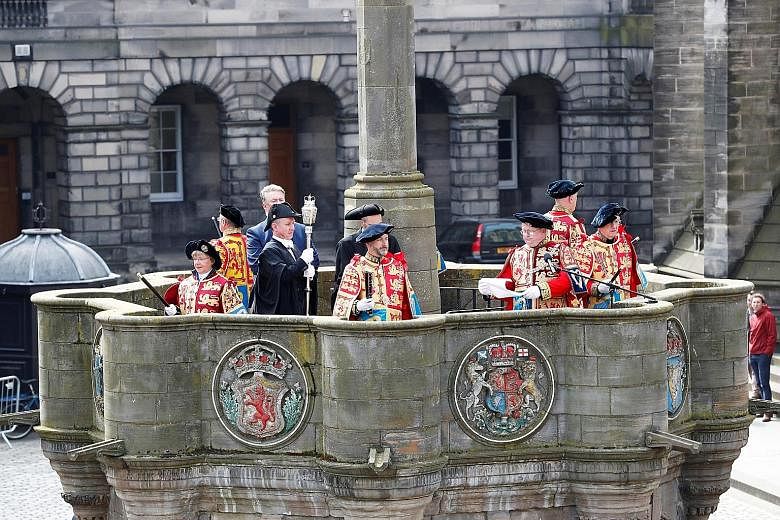LONDON • Britons began voting yesterday in local and regional elections expected to give a taste of how far Conservative Prime Minister Theresa May's dominance extends before next month's national election.
Nearly 5,000 local authority seats were contested across England, Scotland and Wales yesterday, along with eight metropolitan mayoralties.
The results are expected to start coming in from early today.
The outcome should shed some light on how the country will vote in the June 8 General Election, and will be pored over for any confirmation of opinion polls that now give Mrs May's Conservatives a runaway lead over the centre-left Labour Party and the anti-European Union UK Independence Party.
Labour is polling more than 20 points behind the Conservatives, with the local elections expected to indicate the challenge facing the party ahead of the general election.
Said Mr Anthony Wells of polling company YouGov: "They will provide some vital information about the pattern of support and where parties are performing particularly strongly or weakly."
University of Cardiff politics professor Roger Scully said: "The Conservatives are doing very well and that is almost certainly likely to have some spillover into the local elections."
Last month, Mrs May made the surprise decision to call a national election three years ahead of schedule, looking to cash in on her opponents' weakness and increase her political power at home and abroad ahead of exit negotiations with the EU.
However, the results of yesterday's votes will not be a direct proxy for next month's election.
Local elections are held on a different cycle from national votes, and typically see the incumbent party lose ground to opponents.
Furthermore, drawing a national picture from yesterday's vote will be made harder by the absence of council elections in England's biggest cities, where Labour is traditionally strong.
Nevertheless, the proximity of the general election and the political upheaval caused by last year's shock Brexit referendum have created a unique context.
One of the most closely watched indicators will be in central England, where Mrs May has lent her backing to a high-profile campaign to win the mayoralty of a large region encompassing Birmingham, Britain's second-largest city.
Traditionally an area dominated by Labour owing to its industrial roots, a Conservative victory would show the effectiveness of Mrs May's attempts to recast her centre-right party as the champion of Britain's aspirational and working classes.
In Scotland, election results look likely to catch up with a big swing in the political mood there since 2012, reflecting the strength of the pro- independence Scottish National Party, particularly in Glasgow.
Mrs May will also be watching Scotland to see how far her party's revival extends in an area where it has suffered years in the political wilderness.
Polls show the Conservatives could win more seats in Scotland in the general election than it has held for decades.
REUTERS, AGENCE FRANCE-PRESSE

